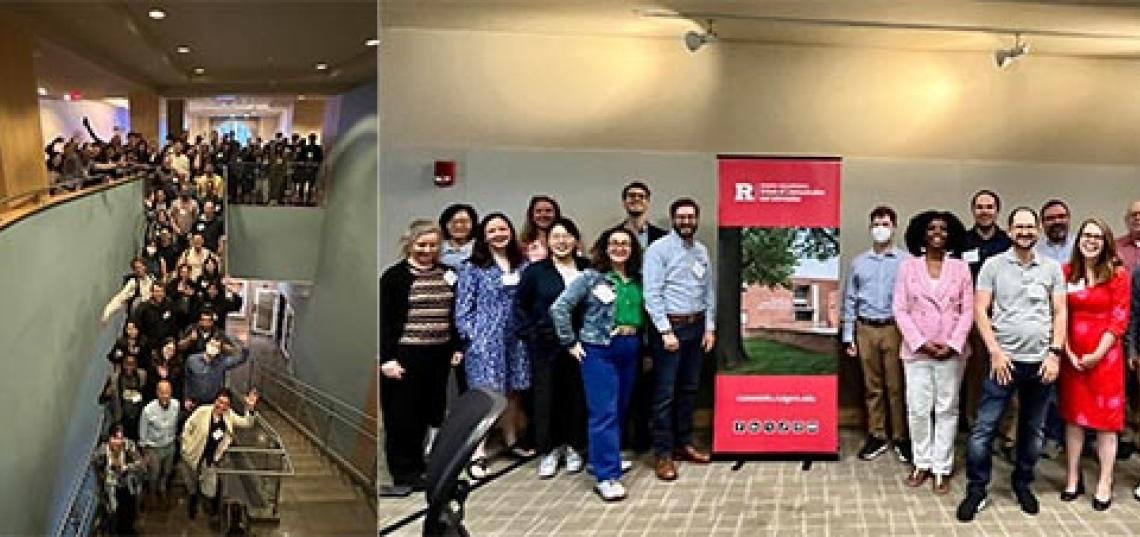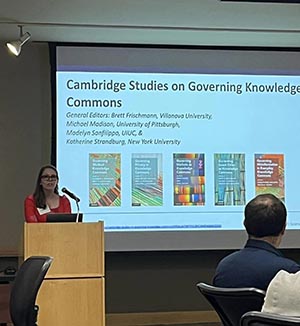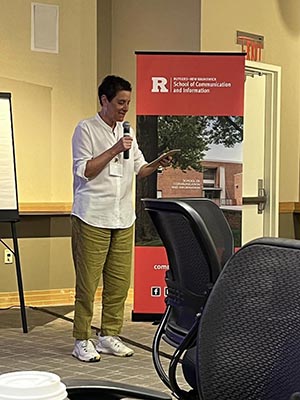
In September 2024 the SC&I Department of Library and Information Science hosted two significant events, the Governing Knowledge Commons in EdTech Workshop and the 6th Annual Symposium on Applications of Contextual Integrity. Both were held at the Heldrich Hotel in New Brunswick, New Jersey, and drew prominent scholars in the library and information science field from across North America.
Governing Knowledge Commons in EdTech Workshop
The Governing Knowledge Commons in EdTech Workshop was held September 25 with the goal of establishing synergy among authors of a forthcoming book contracted with Cambridge University Press on ed-tech governance in the publisher's "Governing Knowledge Commons" book series.
LIS Department Chair and Associate Professor Rebecca Reynolds co-chaired the event with her book co-authors Yan Shvartzshnaider, assistant professor, York University, and Kyle Jones, associate professor, Indiana University. Event attendees included chapter authors and presenters and audience members from Rutgers and the information science field, aiming to coalesce a community of EdTech scholars interested in community-based governance perspectives.
“Governing Knowledge Commons (GKC) is a framework that aims to develop a systematic, empirical basis for understanding the virtues, drawbacks, and mechanics of institutions for sharing knowledge, information, and data in a range of contexts that pertain to ‘knowledge commons,’ Reynolds said, citing Frischmann, Madison, & Strandburg, 2014. “Across such ‘commons,’ shared material both creates and solves social dilemmas. Knowledge commons usually recommends governance anchored in core concepts of collaboration and community.”
 In the context of educational technology, Reynolds noted, many governance issues surface among actors with varying interests, pertaining to data sharing, privacy, surveillance, user rights protections, intellectual property concerns, etc. The event and book aim to bring the GKC governance framework principles to bear on a range of these ed-tech design and deployment concerns, across 8 chapters in-development that were workshopped at the event.
In the context of educational technology, Reynolds noted, many governance issues surface among actors with varying interests, pertaining to data sharing, privacy, surveillance, user rights protections, intellectual property concerns, etc. The event and book aim to bring the GKC governance framework principles to bear on a range of these ed-tech design and deployment concerns, across 8 chapters in-development that were workshopped at the event.
Attendees from SC&I included Dean for Research Mark Aakhus; Professor of Library and Information Science Denise Agosto; Visiting Professor of Library and Information Science Louise Barkhuus; Assistant Professor Jessica Cheng; and Ph.D. student Neil Grimes.
Visiting scholars included Noah Apthorpe, assistant professor, Colgate University; Michael Beauvais, SJD Candidate, University of Toronto Faculty of Law; Jake Chanenson, Ph.D. student, University of Chicago; Philip Doty, associate professor emeritus, University of Texas, Austin; Min Cheong Kim, Ph.D. student, University of Maryland; Ruby Mendenhall, associate professor, University of Illinois at Urbana-Champaign; Madelyn Sanfilippo, associate professor, University of Illinois Urbana-Champaign; Elisabeth Sylvan, affiliate, Berkman Klein Center, Harvard University; Jessica Vitak, professor, University of Maryland; and Kyrie Zhou, Ph.D. student, University of Illinois Urbana-Champaign.
The full-day event was free, funded in part by an NSF grant funding GKC initiatives held by the grant’s Principal Investigator Brett Frischmann, the Charles Widger Endowed University Professor in Law, Business and Economics at Villanova University.
6th Annual Symposium on Applications of Contextual Integrity
The aim of the next 2-day conference, the 6th Annual Symposium on Applications of Contextual Integrity, (Day 1 agenda; Day 2 agenda) held September 27-28, was to address use of the Contextual Integrity framework (Nissenbaum, 2004, 2009) to foster interaction among diverse communities of socio-technical systems research and practice to reason about privacy, and to design and evaluate, craft regulation, and generate formal logics for privacy.
The event was co-chaired by SC&I Chair and Associate Professor of Library and Information Science Rebecca Reynolds; SC&I Visiting Professor Louise Barkhuus; Ruobin Gong, Assistant Professor of Statistics, Rutgers University; and Yan Shvartzshnaider, Assistant Professor, York University.
 On the steering committee were Marshini Chetty, associate professor, University of Chicago; and Helen Nissenbaum*, Professor, Cornell Tech, Cornell University, the Contextual Integrity framework's originator.
On the steering committee were Marshini Chetty, associate professor, University of Chicago; and Helen Nissenbaum*, Professor, Cornell Tech, Cornell University, the Contextual Integrity framework's originator.
"This was a fantastic opportunity for the Rutgers University iSchool community to host, sponsor and participate in the 6th annual convening of scholars whose work resides at the cutting edge of critical privacy research related to socio-technical systems, information systems, and governance,” Reynolds said. “Scholars employing the approach utilize computational, *qualitative and qualitative social science methods in their work, and a diverse range of methods and perspectives as well as socio-technical contexts and sectors were represented in the papers presented.
“We are proud SC&I and the LIS Department were chosen as the 2024 conference location; several of our faculty and doctoral students were actively engaged from start to finish. We look forward to many ongoing continued intersections with this community of scholarship through the collaborative ties formed."
The event was well attended by over 70 registrants. The event dinner, held Friday evening at Fat Cactus Cantina, kicked off the symposium, and the event closed with an NSF-funded Mentor's Lunch for 25 doctoral students who were specially selected to attend.
The next event will be held in Brussels, Belgium in May of 2025; readers can follow notices and pending CFPs on the group website.
*Citation: Nissenbaum, H. (2004). Privacy as contextual integrity. Wash. L. Rev., 79, 119.
Nissenbaum, H. (2009). Privacy in Context: Technology, Policy, and the Integrity of Social Life. Stanford University Press.
Learn more about the Library and Information Science Department at the Rutgers School of Communication and Information on the website.
